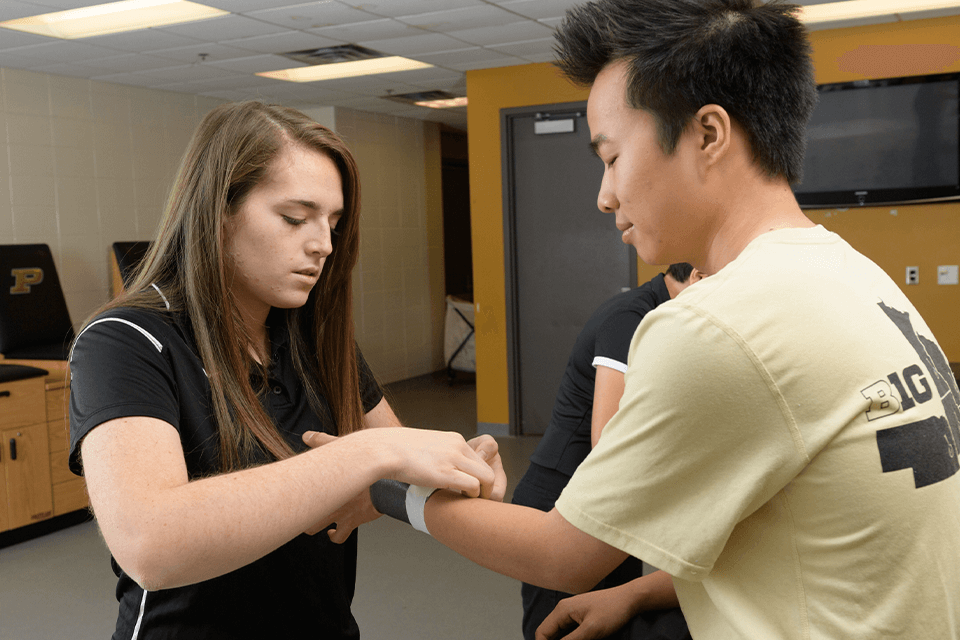Undergraduate Research
Research | College of Health and Human Sciences

Explore the Benefits of Undergraduate Research
Getting involved in one of HHS’ many research laboratories will allow you to apply the knowledge and methods you’ve learned in class to real-world challenges facing human health and well-being, including disease prevention, consumer behavior, health policy, social relationships and much more. Whether you plan to pursue graduate school or a career outside of research, you’ll gain valuable skills to help you succeed, from collecting and analyzing data to presenting complex ideas in simple terms.
Get Involved in HHS Research
From exploring opportunities around the college to selecting a research mentor, the Office of Undergraduate Research offers many resources to help you, including these steps to get started.
As you begin looking for research opportunities, you’ll want to make sure you have an up-to-date resume. Researchers will want to see your most current work and how it relates to their research.
Once you determine the appropriate research area, consider reaching out to the researcher to discuss potential opportunities.
Research opportunities are also regularly distributed through our listserv, which you can join to receive email updates about ways you can get involved.
Join ListservStudent Experiences
Anthony Bovenschen
Senior in Health Sciences
Anthony Bovenschen
Senior in Health Sciences
Anthony Bovenschen, a senior in the Purdue University School of Health Sciences, might have made the cast of “Vanderpump Rules” rethink their drinking habits had the results of his research study been different.
In fall 2023, the young researcher in associate professor Jae Hong Park’s lab investigated eight different bottles of various wines for traces of heavy metals — elements such as lead, arsenic and chromium that are harmful to human health. The work relied heavily on X-ray fluorescence (XRF), which uses X-ray technology to measure amounts of toxic metals in objects such as glass, cork and wine.
Read the full story.
Sarah Haasar
Sophomore in Nutrition Science
Sarah Haasar
Sophomore in Nutrition Science
In her research experience, Haasar has become an expert at guessing the weights of certain foods before they touch the scale as she prepares meals to examine how different amounts of nutrients affect the human body. “It’s a great opportunity. I’m part of the research — behind the scenes getting the functional skills that are transferable to something higher.”
Madeleine Strom
Junior in Health Sciences
Madeleine Strom
Junior in Health Sciences
Aligning with her career aspirations, Strom’s research project investigates how the human brain responds to various toxins by using microelectrode arrays to examine brain cells. “I find this research very interesting because it’s related to what I want to do in the future, and I found new passions after joining this lab. I look forward to learning more by doing research. I get to see firsthand how different processes and actually get to analyze the data we find.”
Shreya Sridhar
Junior in Public Health and Pre-Medicine
Shreya Sridhar
Junior in Public Health and Pre-Medicine
I’m currently an undergraduate researcher in Dr. Huber’s Motor Speech Lab in the Department of Speech, Language and Hearing Sciences, where I study Parkinson’s disease (PD). We focus on analyzing the cognitive and motor impairments caused by PD in older individuals. In the lab, we listen to Parkinsonian speech and collect corresponding data from different research studies to better understand how to improve PD symptoms. As a new student in the lab, I learned the most by asking questions and challenging myself with different tasks as well as building personal and professional relationships with the undergraduate students, graduate students and lab assistants!
William Mahoney
Junior in Health Sciences, Pre-Professional
William Mahoney
Junior in Health Sciences, Pre-Professional
My research focuses on mapping neurotransmitters in the insular cortex in response to pain. In Uzay Emir’s lab, we use magnetic resonance imaging (MRI) as well as magnetic resonance spectroscopic imaging (MRSI) as our main tools for data acquisition. We produce images of the brain and other body components and then determine and study metabolite concentrations within those images. Learning the basics of MRI as well as comparing and analyzing data from scans never ceases to be fascinating and provides a unique learning experience I can apply to future aspirations and projects. Learning about other research being conducted at Purdue and collaborating with professors, graduate students and other undergraduate students has been an engaging and a beneficial experience that is difficult to find anywhere else.
Jackie Meade
Junior in Hospitality and Tourism Management
Jackie Meade
Junior in Hospitality and Tourism Management
I analyze secondary academic sources to understand more about urban exploration and elements of inequality in urban exploration. I have had the opportunity to present research findings at three different undergraduate research conferences. Research during the time of a pandemic has taught me a lot about being flexible and working around challenges.